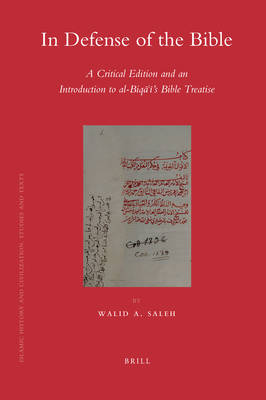
- Afhalen na 1 uur in een winkel met voorraad
- Gratis thuislevering in België vanaf € 30
- Ruim aanbod met 7 miljoen producten
- Afhalen na 1 uur in een winkel met voorraad
- Gratis thuislevering in België vanaf € 30
- Ruim aanbod met 7 miljoen producten
Zoeken
In Defense of the Bible
A Critical Edition and an Introduction to Al-Biqāʿī's Bible Treatise
Walid Saleh
€ 236,95
+ 473 punten
Omschrijving
The history of the Islamic interaction with the Scriptures of Judaism and Christianity has been studied extensively in academia. The prevailing view is that Muslims had hardly any religious appreciation to the Bible and when used by Muslims it was mainly in apologetic or polemical settings. The document presented here squarely contradicts such a view. The treatise argues for the permissiblity of using the Bible by Muslims for religious purposes. Al-Biqāʿī, the author of this treatise, wrote a huge Qurʾān commentary that used the Hebrew Bible and the Gospels to interpret parts of the Qurʾān. Al-Sakhāwī, a bitter enemy, opposed such a practice. The document preserves for us a fundamental argument inside Islam about the value of the Scriptures of other religions.
Specificaties
Betrokkenen
- Auteur(s):
- Uitgeverij:
Inhoud
- Aantal bladzijden:
- 223
- Taal:
- Engels
- Reeks:
- Reeksnummer:
- nr. 73
Eigenschappen
- Productcode (EAN):
- 9789004168572
- Verschijningsdatum:
- 10/07/2008
- Uitvoering:
- Hardcover
- Formaat:
- Genaaid
- Afmetingen:
- 165 mm x 241 mm
- Gewicht:
- 517 g

Alleen bij Standaard Boekhandel
+ 473 punten op je klantenkaart van Standaard Boekhandel
Beoordelingen
We publiceren alleen reviews die voldoen aan de voorwaarden voor reviews. Bekijk onze voorwaarden voor reviews.








